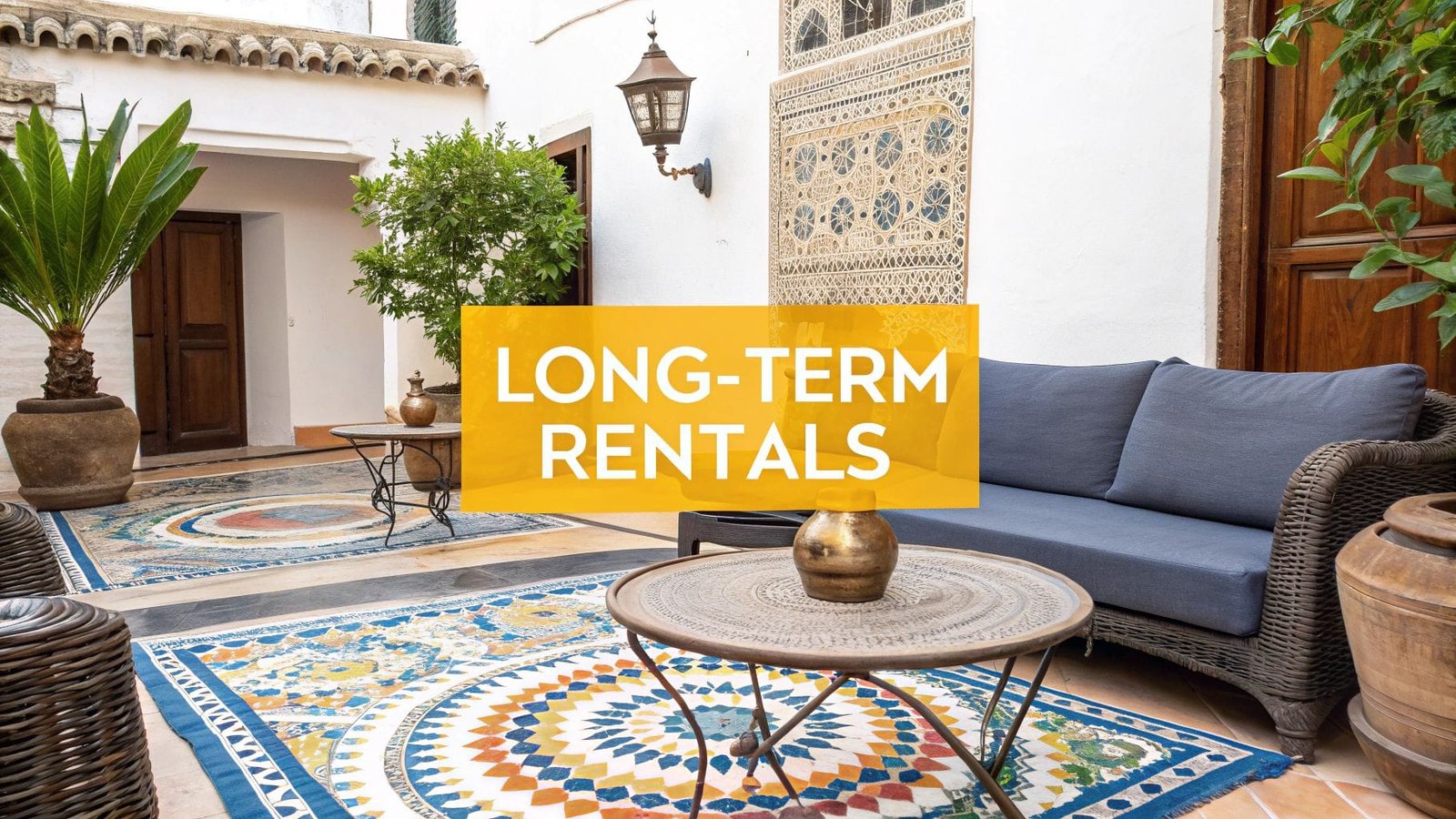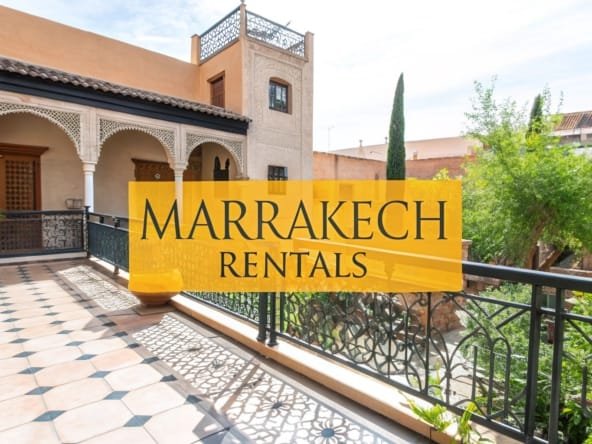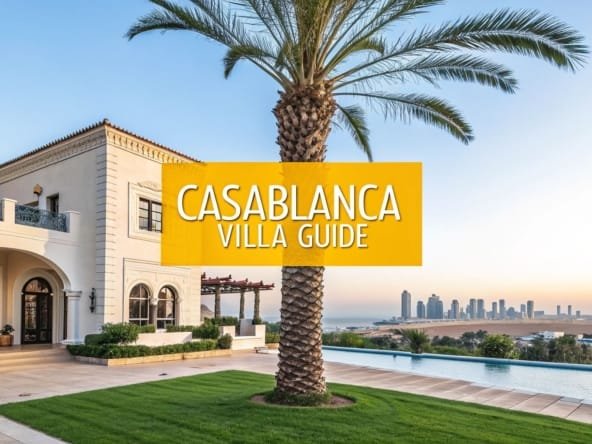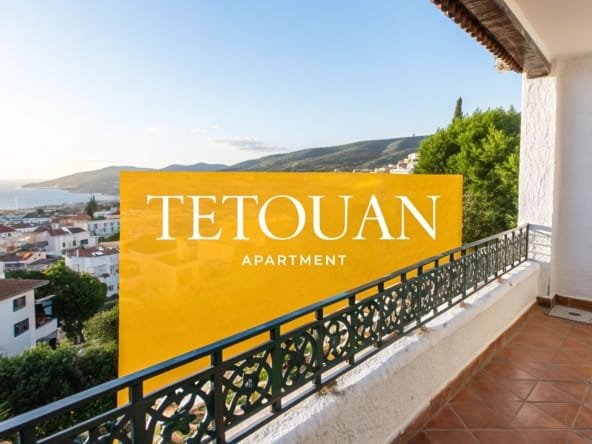When you hear the term location longue durée in Morocco, it’s best to think of it as more than just renting a flat. It’s about setting up a proper home. This isn’t a short-term holiday let; it's a commitment, typically for a year or more, that falls under a specific legal framework designed to give tenants stability and clear rights.
What Location Longue Durée Means for You

Signing up for a location longue durée is the standard way people find housing in Morocco’s vibrant cities. It marks a real shift in mindset—from being a passing visitor to becoming a resident. A tourist might rent a riad for a week, but a long-term tenant signs a formal contract, a contrat de bail, which lays out the terms of a lasting relationship with the property and its owner.
This kind of arrangement is the very backbone of the urban rental market. It serves everyone from local Moroccan professionals to expats looking to plant some roots. It’s a world away from a holiday rental, which is brief and purely transactional. A long-term lease, on the other hand, is relational, grounded in shared responsibilities and legal safeguards.
The Core Benefits of a Long-Term Lease
Opting for a location longue durée brings a handful of solid advantages that really improve your security and quality of life. The whole point is stability, not short-term flexibility, making it the perfect choice if you're planning to stay in Morocco for a while.
Here’s what you stand to gain:
- Price Stability: Your monthly rent is usually locked in for the entire lease term, often one year. This protects you from the wild price swings you see in tourist hotspots, making it far easier to budget.
- Personalisation and Comfort: A long-term lease gives you the freedom to make a place feel like your own. You can bring in your own furniture, hang up art, and truly settle in—a luxury you just don't get in a furnished holiday flat.
- Community Integration: Staying in one spot for a year or more means you can actually become part of the neighbourhood. You’ll get to know the shopkeepers, greet your neighbours, and find your place in the local rhythm of life. It’s a much deeper, more authentic cultural experience.
- Enhanced Tenant Rights: Moroccan law gives long-term tenants specific protections. These laws cover everything from lease renewals and eviction rules to the landlord’s duty for maintenance, giving you a peace of mind that short-term lets simply can't offer.
A long-term rental contract is more than just a piece of paper; it's your legal foundation for building a life in Morocco. It transforms a property from a temporary lodging into a personal sanctuary, granting you the stability needed to thrive.
Getting your head around the concept of location longue durée is the crucial first step. It shapes how you'll search for a property, what you can legally expect, and ultimately sets the stage for a stable, successful life in your new Moroccan home. With this understanding, you can navigate the market with real confidence.
A Look at the Long-Term Rental Market

If you've ever tried to find a long-term rental in Casablanca or Marrakech, you’ve likely felt the competition. It can feel like a race, and there's a good reason for that: demand is incredibly high. This isn't just a temporary trend; it's the result of major economic and social shifts that have been shaping Morocco for years. Getting a handle on these forces is the first step to successfully finding your next home.
The main engine driving this competitive market is urbanisation. For decades, a steady stream of people has been moving from rural villages to city centres, drawn by the promise of better jobs, education, and a more modern lifestyle. This constant migration has created a persistent, pressing need for stable housing in all of Morocco's major cities.
This influx of people has a direct impact on everything from rental prices to property availability. With more people vying for a limited supply of homes, landlords naturally have the upper hand, and prices climb. It also fuels urban development, spurring the construction of apartment buildings designed to house a growing city-based workforce.
The Urbanisation Effect on Housing
The sheer scale of this demographic shift is hard to overstate. According to Morocco’s High Commission for Planning (HCP), the urban population exploded from around 43% in 1980 to over 64% by 2020. This rapid growth has placed enormous strain on the housing markets in key hubs like Casablanca, Rabat, and Marrakech, creating the intense environment many tenants face today. You can dive deeper into Morocco's urban development in this detailed study.
This pressure means finding the right location longue durée is about more than just good luck—it requires a solid plan. The market dynamics favour tenants who are organised, can make decisions quickly, and know exactly what they're looking for. A well-kept two-bedroom flat in a popular neighbourhood, for example, is almost guaranteed to have several interested applicants.
Beyond the population boom, economic realities also play a huge part. Cities are job magnets, attracting young professionals and families who often can't afford to buy a home, at least not right away. For this group, long-term renting isn't just a preference; it's a practical necessity, which adds even more fuel to the demand.
Think of it like this: understanding the market is like knowing the currents before you set sail. When you grasp the forces of urbanisation and economic demand, you can better anticipate challenges, recognise a great opportunity when you see one, and steer your property search with confidence.
How to Navigate a High-Demand Market
In a landlord's market, being prepared and moving quickly are your two biggest advantages. Good properties can be advertised and gone in a matter of days, sometimes even hours. This fast pace means you need to have all your paperwork and finances sorted out before you even start looking.
Here’s a snapshot of what you'll be up against in the current rental market:
- Slim Pickings in Prime Areas: The most desirable neighbourhoods—those with good transport links and amenities—have very low vacancy rates.
- Less Wiggle Room on Price: While you can always try to negotiate, landlords often have several offers on the table and are less inclined to accept a lowball one.
- Local Knowledge is Key: Knowing the ins and outs of different city districts is a game-changer. Our guide on finding an apartment for long-term rent in Marrakech is packed with this kind of local insight.
At the end of the day, the competitive nature of Morocco's rental scene is a direct reflection of the country's dynamic growth. By understanding the root causes—the powerful pull of the cities and the economic realities for many Moroccans—you'll be in a much better position to find a great location longue durée with realistic expectations and a winning strategy.
Navigating Moroccan Rental Agreements and Laws
When you decide to rent long-term in Morocco, the single most important document you'll encounter is the lease agreement, or contrat de bail. It’s easy to see it as just another piece of paperwork, but in reality, this contract is the foundation of your entire tenancy.
Think of it as the official rulebook for your new home. It’s a legally binding agreement that clearly defines the responsibilities of both you and the landlord. From rent payments to repair duties, everything is laid out. Relying on a verbal agreement is a huge risk—it offers almost no legal protection and opens the door to disputes. A written, registered contract is your security.
Key Clauses You Must Understand
When you get your hands on a Moroccan lease, there are a few specific clauses that deserve your full attention. These are the nuts and bolts of your rental agreement, and getting them right from the start can save you a world of headaches later on.
Before you even think about signing, make sure you've thoroughly reviewed these critical components:
- Lease Duration (Durée du Bail): This sets the length of your rental term, which is typically one year for a long-term let. It should also specify how renewals work; often, they're automatic unless either you or the landlord gives formal notice to end it.
- Security Deposit (La Caution): This is the upfront payment a landlord holds to cover any potential damages. By law, it's usually capped at two months' rent. The contract must state the exact amount and spell out the conditions for getting it back when you move out.
- Rent and Associated Charges (Loyer et Charges): The agreement needs to be crystal clear about your monthly rent and what it covers. Are utilities like water and electricity separate? What about building fees (syndic)? Nailing this down prevents any nasty financial surprises.
- Termination Clause (Clause de Résiliation): This part details the official process for ending the lease early. It includes the required notice period (préavis), which is generally one to two months for both the tenant and the landlord.
This image breaks down the common figures you’ll see in a long-term rental contract in Morocco.
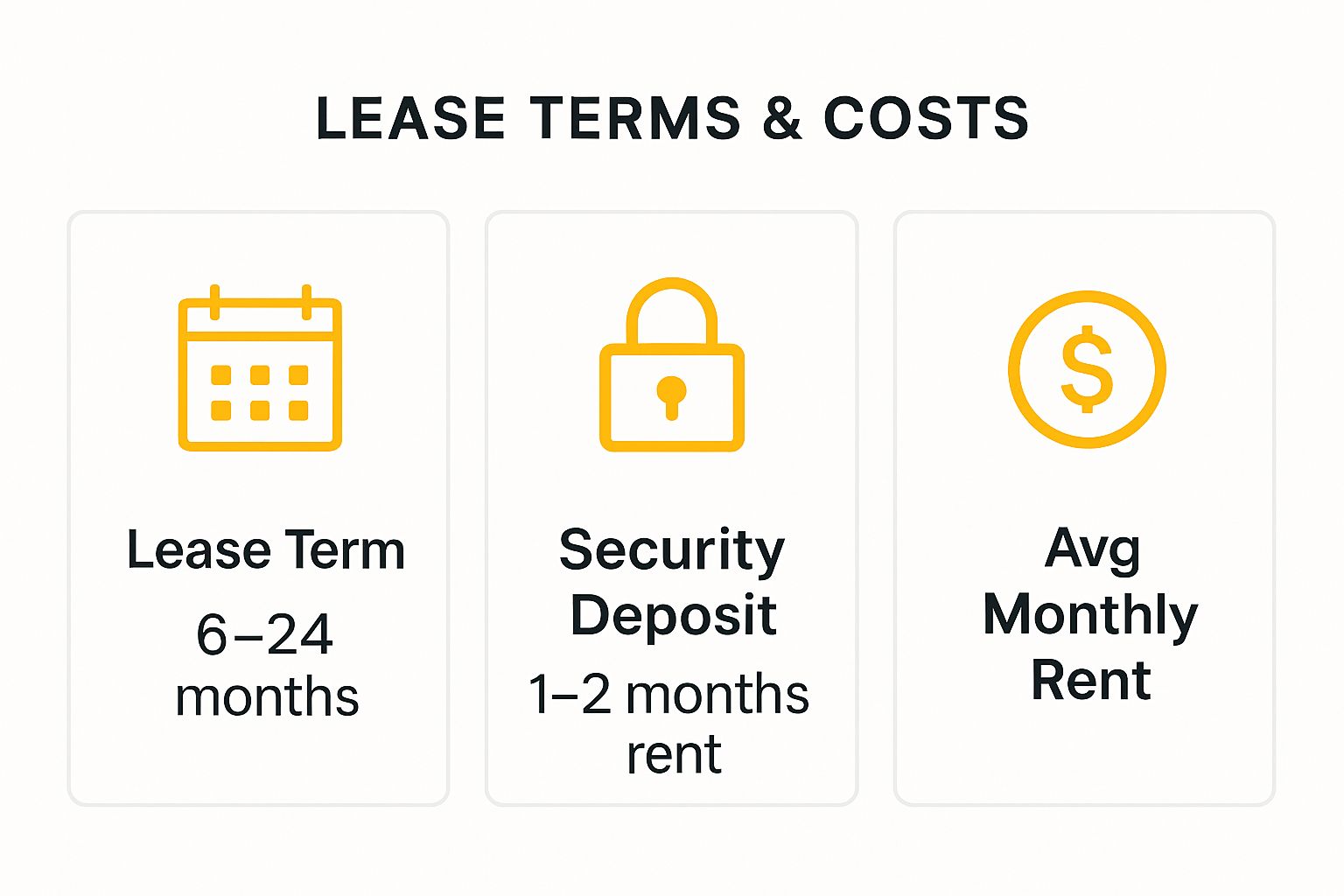
As you can see, the standard commitment for a long-term rental typically involves a one-to-two-year lease and a security deposit of one or two months' rent.
Distinguishing Furnished and Unfurnished Rentals
In Morocco, the law doesn't treat all rentals the same. There's a significant legal distinction between renting a furnished (meublé) property and an unfurnished (vide) one. This choice impacts everything from the lease duration and deposit rules to how easily the contract can be terminated.
If you want to dive deeper into the legal language and official structure, our guide on the Moroccan contrat de bail breaks it all down. It’s a great resource for making sure your agreement is fully compliant.
To give you a clear picture, let's compare the two side-by-side. Understanding these differences is crucial for choosing the right option for your situation.
Furnished vs Unfurnished Long-Term Rentals in Morocco
| Feature | Unfurnished Rental ('Location Vide') | Furnished Rental ('Location Meublée') |
|---|---|---|
| Lease Duration | Usually a fixed one-year term, often with automatic renewal. | More flexible. Can be shorter (e.g., six months), but one year is still common. |
| Tenant Protection | Tenants have stronger legal protections against eviction and rent hikes. | Protections are still in place, but landlords have a bit more flexibility when the contract ends. |
| Notice Period | Typically requires a longer notice period to terminate, often two months. | The notice period is usually shorter, commonly just one month. |
| Rent Regulation | Rent increases are strictly regulated by law, capped at a set percentage every few years. | Rent is more negotiable and can be adjusted more easily between contract renewals. |
Ultimately, choosing between furnished and unfurnished depends on your need for flexibility versus long-term security. Both have their place, but the legal frameworks are designed to reflect these different needs.
In the end, a properly registered contract is your shield. It ensures any disagreements are resolved according to Moroccan law, not someone's mood. It elevates your rental from a casual handshake deal to a formal, protected agreement, giving you the peace of mind to truly settle in and make a home.
Your Step-by-Step Guide to Securing a Rental
Finding your perfect long-term rental in Morocco is an exciting prospect, but it’s a process you need to navigate methodically. Think of it less like a simple search and more like a journey with a few key stages. Following a clear path will take you from scrolling through listings to holding the keys to your new home, all with a lot more confidence.
The journey starts, of course, with the search itself. You have two main options: you can either team up with a real estate agent (agence immobilière) or go it alone using online portals. Both routes can get you there, but they offer very different experiences.
Kicking Off Your Property Search
Engaging an agency can be a massive time-saver. Agents often know about properties before they even hit the market and can do the initial legwork for you. On the flip side, diving into online platforms like Avito.ma or Mubawab.ma yourself gives you a fantastic, unfiltered view of what's out there, letting you compare areas and prices at your own pace.
So, which way should you go?
- Real Estate Agencies: This is often the go-to for expats or anyone pressed for time. A good agent lines up viewings, talks to landlords, and provides priceless local knowledge. The trade-off? You'll pay an agency fee, which is usually the equivalent of one month's rent.
- Online Portals: If you're more of a hands-on person, these sites are a goldmine. You can filter down to the exact neighbourhood, price, and size you want, putting you in the driver's seat. Just be prepared to handle all the calls, emails, and vetting yourself.
Once you’ve got a shortlist of places that look promising, it's time for the most critical phase: the viewing. This is where you get to see if the reality lives up to the photos.
Mastering the Property Viewing
A viewing isn’t just a quick peek inside. It’s your one chance to do a proper inspection, so go in armed with a mental checklist and a list of questions. Getting this right can save you from a world of headaches down the line.
Treat the viewing like an interview for your future home. You're not just seeing if you like the place; you're gathering intelligence to make a smart decision.
When you're there, get into the details. Look for any signs of damp, check the water pressure in the shower, test a few electrical sockets, and get a feel for the general upkeep. Don't hesitate to ask about utility costs, any building fees (syndic), or why the last tenants left. You need to know exactly what you’re getting into.
From Negotiation to Signing the Lease
Found a place you love? Great. Now comes the business end of things: negotiation and paperwork. It's perfectly normal to discuss the rental price, especially if you’re committing to a longer lease. Once you and the landlord have shaken hands on the terms, you'll need to gather your documents to make the location longue durée official.
Landlords will almost always ask for the following:
- Proof of Identity: A copy of your passport or, for Moroccans, your national ID card (CIN).
- Proof of Income: Recent payslips or a letter from your work showing you can comfortably cover the rent.
- Residency Permit: If you're an expat, your carte de séjour is often necessary to confirm your legal status.
With your documents approved, there's one final, crucial step before you get the keys: the état des lieux. This is a detailed inventory and condition report that documents the state of every room, fixture, and fitting. You and the landlord will walk through the property together and both sign it. This document is absolutely critical—it’s what protects your security deposit by creating a baseline of the property's condition, ensuring a smooth and argument-free tenancy from the very start.
How History Shapes Today's Urban Housing
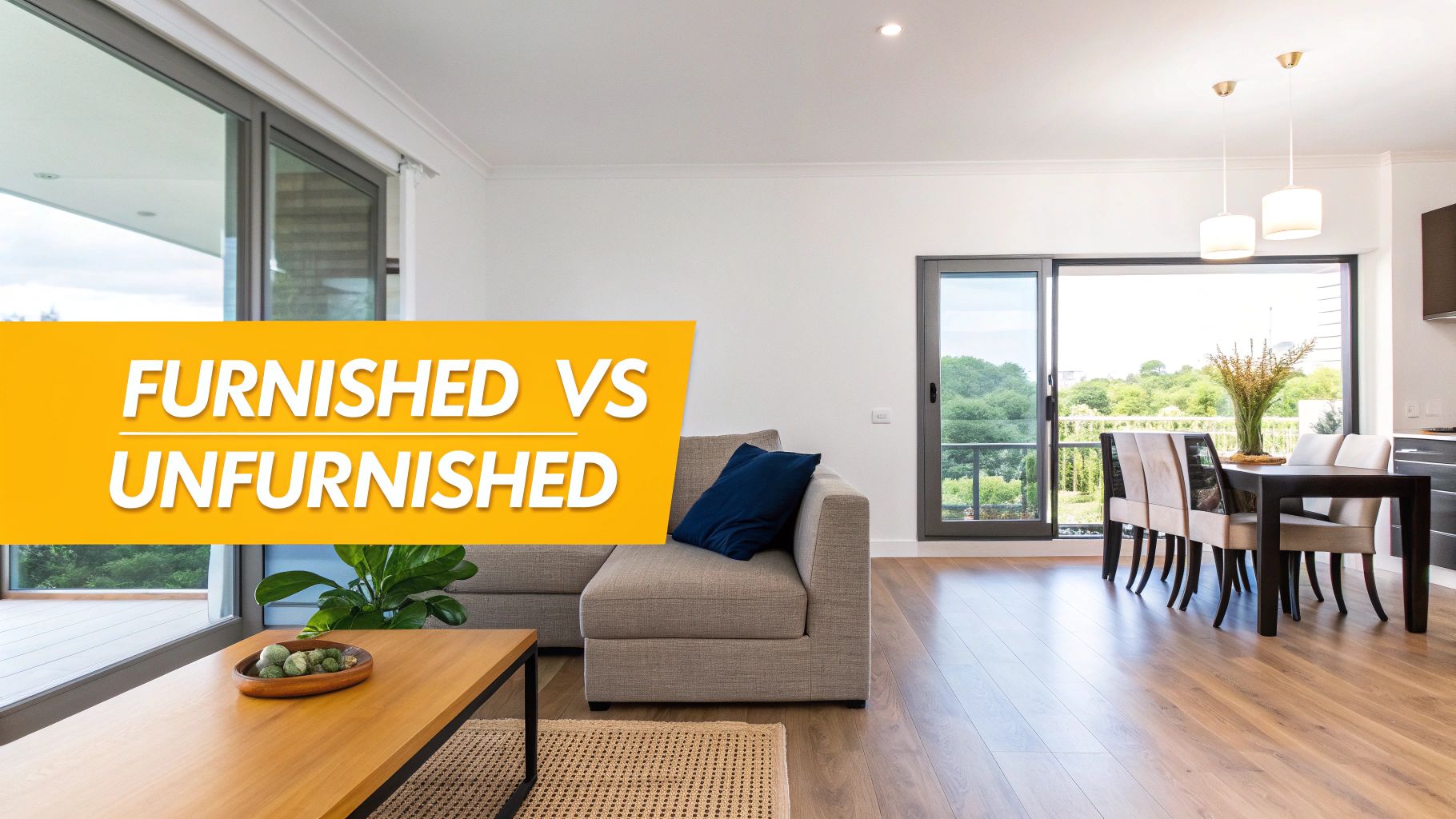
To really get a feel for Morocco's rental market today, you have to look back. The way cities like Casablanca, Rabat, and Marrakech are laid out is no accident. It’s the direct result of powerful historical forces, especially from the French Protectorate era between 1912 and 1956. This period left a deep mark on urban design and housing that you can still see and feel in the location longue durée market.
The French colonial administration brought a completely new, methodical approach to urban planning, one heavily influenced by European design. Their goal was to create cities with distinct, functional zones—separating government buildings, commercial areas, and residential neighbourhoods. This was a radical shift from the organic, maze-like streets of the traditional medinas.
This vision gave birth to the villes nouvelles, or "new cities," built right next to the historic old towns. These new districts featured wide boulevards, public green spaces, and modern apartment buildings designed for European settlers and colonial officials. It was during this time that the very idea of a formal, long-term rental system with written contracts began to take hold to manage all these new properties.
The Colonial Blueprint for Urban Living
This deliberate separation between the old medina and the new European quarters created a dual city structure that remains very much alive today. The villes nouvelles popularised a new way of living: multi-storey apartment blocks. This model has since become the default for urban life across Morocco and essentially laid the groundwork for the modern property market.
Under French rule, cities were systematically reorganised. In Casablanca, for example, authorities rolled out ambitious urban plans to create distinct European neighbourhoods filled with durable rental housing for the settler population. It was a staggering transformation. By the 1930s, Casablanca had exploded from a small port town of about 20,000 people in 1900 to a bustling city of over 250,000. Nearly 60% of its residents lived in these newly built, long-term rental accommodations. You can explore more about this period through detailed research on Moroccan urban history on JSTOR.
This legacy is exactly why you'll find such a striking contrast in housing styles as you move from one neighbourhood to another. The architecture and street plans in places like Guéliz in Marrakech or the central districts of Casablanca are direct echoes of planning decisions made almost a century ago.
Understanding this history is like having a map that explains the "why" behind a city's layout. It reveals that the apartment buildings and formal rental agreements common today are not just modern developments but are deeply rooted in a colonial past that reshaped Morocco’s urban identity.
Enduring Influence on Modern Rentals
The impact of this era goes far beyond just bricks and mortar. It established cultural norms and expectations in the rental market that are still in place.
- Formalisation of Contracts: The protectorate’s bureaucratic approach to property management helped cement the importance of having a written lease agreement—a practice that continues to define the formal rental sector.
- Apartment-Centric Living: The preference for apartment living in cities was solidified during this period, shaping the type of housing stock that has been developed for decades.
- District Specialisation: The zoning of cities into specific residential and commercial areas is a concept that still heavily influences property values and rental demand across different parts of town.
When you connect these historical dots, you get a much richer picture of the current location longue durée market. The distinct neighbourhoods, the dominance of apartment living, and the formalised rental processes all trace their origins back to this transformative period in Moroccan history.
Essential Advice for Expats and Investors
Diving into Morocco's property market as a foreigner is an exciting prospect, but it comes with its own unique set of rules and cultural quirks. Whether you're an expat looking to plant some roots or an investor eyeing the buy-to-let scene, a little local knowledge goes a long way. This advice is designed to help you navigate your location longue durée and avoid the common stumbles.
For expats, a happy rental experience is often about the little things—the cultural details that aren't in the contract. For example, get to know your building's concierge, the gardien. He's more than just security; he's often your go-to guy for small repairs, local tips, and receiving packages. Building a good relationship here is worth its weight in gold.
And when it comes to price, remember that negotiation is part of the culture. While the rent is often flexible, approach it with respect and a sense of what's fair, especially in sought-after neighbourhoods.
Practical Tips for Expat Renters
Finding the perfect flat is just the beginning. You'll need to be ready for the paperwork and know how to handle the practicalities.
- Verify Ownership: Before a single dirham changes hands, ask to see the property's title deed (titre foncier). This one simple check is your best defence against rental scams.
- Handle Utilities Correctly: Get clarity from the start: will the water and electricity bills be in your name or the landlord's? If you need to transfer them, you'll likely need your registered lease agreement, so sort this out early in the process.
- Overcome Language Barriers: Your lease agreement, the contrat de bail, might be in Arabic, even if you’ve been communicating in French. If you're not fluent, it's wise to have a trusted translator review every clause so you know exactly what you're signing.
A well-prepared tenant is a respected tenant. Showing up with your documents organised and demonstrating an understanding of local customs will start your relationship with your new landlord on the right foot.
Strategic Insights for Foreign Investors
For foreign investors, Morocco’s rental market holds real promise, but you need to play it smart. The country is quite open to foreign property ownership, but success hinges on understanding the nuances of the local market.
Rental yields can swing dramatically from one city to another. Casablanca, the economic engine, has a constant demand from professionals. Marrakech, on the other hand, pulls in a vibrant mix of expats and digital nomads, creating a hot market for stylish, furnished flats. Digging into these local trends is your first job. To get a better feel for the numbers, it helps to understand the general cost of living in Morocco, as it shapes what people can afford to pay in rent.
So, what kind of properties are in high demand for location longue durée? Think two-bedroom apartments in secure buildings with modern finishes. Anything in a gated community with parking, or close to international schools and business hubs, will always be a magnet for the expat and professional tenants you want to attract. Focusing on these high-demand properties is the surest way to boost your occupancy rates and make your Moroccan property venture a success.
Got Questions About Renting in Morocco?
Stepping into the Moroccan rental market for the first time can feel a little daunting. You've probably got a dozen questions running through your mind, which is perfectly normal. This section is here to give you straightforward answers to the things people ask us most often about securing a location longue durée.
Think of it as your quick-reference guide. We’ll tackle the practical, need-to-know details that pop up when you start your search.
What Paperwork Will I Need to Rent a Flat?
First things first, getting your documents in order is half the battle. A landlord’s main concern is finding a reliable tenant, so showing up prepared makes a huge difference. It tells them you’re serious and organised, which instantly puts you ahead of the competition.
While some landlords might ask for slightly different things, there's a core set of documents you’ll almost always need. Have these ready to go, and you’ll find the whole process moves much faster.
Here’s your essential checklist:
- Your ID: A clear copy of your passport is a must for foreigners. If you’re a Moroccan citizen, you’ll need a copy of your national ID card (the CIN).
- Proof You Can Pay: Landlords need to know you can comfortably cover the rent. This usually means your last few payslips or an official letter from your employer confirming your salary.
- Your Residence Permit: For any expat planning to stay, the Carte de Séjour is non-negotiable. It’s the official document proving you have the legal right to live in Morocco, and landlords will absolutely ask to see it for a formal lease.
Is It Okay to Negotiate the Rent?
Absolutely. In fact, it’s a very normal part of the rental culture in Morocco. Don't be shy about it, but do approach it with a bit of finesse. How much wiggle room you have really depends on the property itself.
If you're looking at a brand-new flat in a sought-after spot like Guéliz in Marrakech, the landlord likely has other people lining up. In that case, they'll be less inclined to drop the price. On the other hand, if a place has been sitting empty for a few months, you're in a much stronger position to negotiate. Always be polite and have a reason for your offer—suggesting a longer lease term is a great way to justify a slightly lower price.
As a general guide, aiming for 5-10% off the asking price is a reasonable starting point. It shows you’re a serious applicant, not just someone trying their luck with a lowball offer.
What If I Have to End My Lease Early?
Life happens, and sometimes plans change. If you find yourself needing to move out before your lease is up, the first place to look is your rental contract, the contrat de bail. It will have a termination clause, or clause de résiliation, that spells out exactly what you need to do.
Typically, you'll need to give your landlord formal written notice, usually one to two months ahead of time. If you leave without giving proper notice, there will likely be a financial penalty. Most often, this means you’ll have to say goodbye to your security deposit (caution). It's worth remembering that a landlord could technically pursue you for the remaining rent, so make sure you read and understand this part of the contract before you ever sign.
Ready to find your perfect long-term rental in Morocco without the hassle? The expert team at Rich Lion Properties has the local knowledge and extensive listings to guide you every step of the way. Explore your options today at https://richlionproperties.com.
